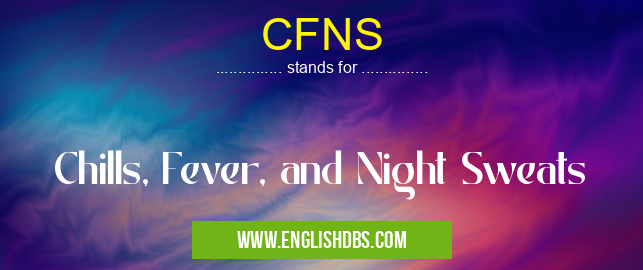What does CFNS mean in PHYSIOLOGY
CFNS stands for Chills, Fever, and Night Sweats. It is a combination of symptoms that can be indicative of an underlying medical condition. They usually involve feelings of extreme cold or hot temperatures, excessive sweating, and shivering during the night. People who experience these symptoms should seek prompt medical attention to determine the root cause and possible treatment options.

CFNS meaning in Physiology in Medical
CFNS mostly used in an acronym Physiology in Category Medical that means Chills, Fever, and Night Sweats
Shorthand: CFNS,
Full Form: Chills, Fever, and Night Sweats
For more information of "Chills, Fever, and Night Sweats", see the section below.
» Medical » Physiology
Causes
The most common causes of CFNS are infections such as influenza, pneumonia, tuberculosis, HIV/AIDS, parasitic diseases, strep throat and many other viral and bacterial infections. Certain autoimmune disorders such as rheumatoid arthritis (RA) and systemic lupus erythematosus (SLE) or certain cancers can cause CFNS as well. Additionally, some medications may also lead to this symptom combination.
Symptoms
Common symptoms associated with CFNS include feeling abnormally cold or hot accompanied by chills or shivering; fever; severe perspiration during the night; pain in the joints that worsens with movement; fatigue; muscle aches; shortness of breath; loss of appetite; weight loss; nausea and vomiting.
Diagnosis
In order to diagnose CFNS, your doctor will likely complete a physical examination to assess your overall health condition including temperature readings and checking for any swelling or tenderness on your body parts. Your doctor may also ask about your recent travel history or whether you’ve been exposed to anyone with similar symptoms in order to eliminate any infectious disease as a potential cause for CFNS. Additionally, blood tests may be conducted to identify bacteria or viruses present in the bloodstream while imaging tests like X-rays may be used to detect any abnormalities in your lungs if pneumonia is suspected as a cause for CFNS.
Treatment
The type of treatment administered will depend on the underlying condition causing CFNS but generally involves medications such as antibiotics for bacterial infections while anti-viral drugs are used for viral infections like influenza. Corticosteroids may be prescribed to reduce inflammation due to autoimmune conditions while chemotherapy is used for treating cancers causing CFNS-like symptoms. In cases where no underlying condition is discovered after extensive diagnostics tests have been carried out then complementary therapies including acupuncture and reflexology may be suggested instead.
Essential Questions and Answers on Chills, Fever, and Night Sweats in "MEDICAL»PHYSIOLOGY"
What is CFNS?
CFNS stands for Chills, Fever, and Night Sweats. It is a group of symptoms that may indicate an underlying medical condition.
What causes CFNS?
The cause of CFNS can vary depending on the individual. Common causes include viral infections, bacterial infections, auto-immune diseases such as lupus, and certain types of cancer.
How can I tell if I have CFNS?
If you have chills that are accompanied by a fever or night sweats, then you could be experiencing CFNS. It is important to talk to your doctor for a proper diagnosis.
Are there any treatments for CFNS?
Treatment for CFNS will depend on the underlying cause. Generally speaking, medications such as antibiotics or antivirals can be used to treat infections while immunosuppressants can help with auto-immune diseases and chemotherapy for cancer-related cases.
When should I see a doctor if I'm experiencing CFNS?
It is recommended to seek medical attention if you have been experiencing chills, fever and night sweats for more than a few days in succession or with any additional concerns.
Are there any home remedies for treating CFNS?
While most cases of CFNS should be evaluated by a medical professional, some mild cases may benefit from over-the-counter pain relievers as well as warm baths and restful sleep. Drinking plenty of fluids also helps to keep our bodies hydrated and healthy which may help relieve some symptoms of milder cases of CFNS.
Do people with other health conditions experience different symptom when it comes to CFNS?
Yes, people with other pre-existing conditions may experience different types of symptoms due to weakened immune systems or due to their condition itself. It's important to discuss your particular case with your doctor who will be able assess your symptoms and provide an accurate diagnosis based on your medical history.
Could lifestyle choices affect the severity of my symptoms?
To some extent yes - making healthful lifestyle choices such as regular exercise, avoiding alcohol/smoke consumption as well as adopting healthy dietary habits can help reduce inflammation in our body which then plays a role in improving overall immunity which in turn may mitigate the severity of symptoms associated with ailments such asCFNSS.
Final Words:
CFNS is a combination of symptoms that can point towards an underlying medical condition hence it is essential that people experiencing them promptly seek medical attention for appropriate diagnosis and treatment. Even though there are multiple possible causes leading up to this symptom complex ranging from infections to autoimmune disorders even cancer hence it is important not take anything lightly when it comes to ensuring one’s physical health.
CFNS also stands for: |
|
| All stands for CFNS |
